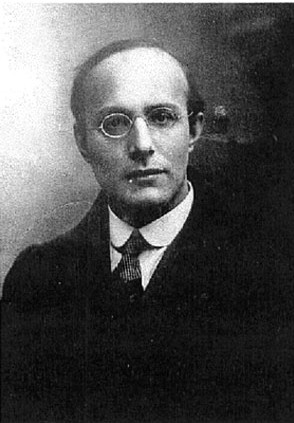Karl Polanyi facts for kids
Quick facts for kids
Karl Polanyi
|
|
|---|---|

Polanyi, c. 1918
|
|
| Born | 25 October 1886 |
| Died | 23 April 1964 (aged 77) |
| Spouse(s) |
Ilona Duczynska
(m. 1923) |
| Field | Economic sociology, economic history, economic anthropology |
| School or tradition |
Historical school of economics |
| Influences | Robert Owen, Bronisław Malinowski, G. D. H. Cole, Richard Tawney, Richard Thurnwald, Karl Marx, Aristotle, Karl Bücher, Ferdinand Tönnies, Adam Smith, Alfred Radcliffe-Brown, Werner Sombart, Max Weber, György Lukács, Carl Menger |
| Contributions | Embeddedness, Double Movement, fictitious commodities, economistic fallacy, the formalist–substantivist debate (substantivism) |
Karl Paul Polanyi (25 October 1886 – 23 April 1964) was an important thinker from Austria-Hungary. He studied how societies organize their economies. He was known for his book The Great Transformation. In this book, he questioned the idea that markets can always run themselves without any rules.
Polanyi introduced the idea of the Double Movement. This is about how societies try to create markets, but then people also push back to protect themselves from the negative effects of those markets. He believed that modern market-based societies were not meant to be, but rather developed over time.
He is also famous for substantivism. This idea says that economies are deeply connected to a society's culture and way of life. This is different from what many mainstream economists believe. However, it is popular in fields like anthropology and economic history.
Polanyi's ideas have been used to study ancient economies, like those in Pre-Columbian America and ancient Mesopotamia. His book The Great Transformation also became a key text for understanding how societies change over time.
Contents
Early Life and Education
Polanyi was born in Vienna, which was then the capital of the Austro-Hungarian Empire. He came from a Jewish family. His younger brother, Michael Polanyi, became a famous philosopher. His niece, Eva Zeisel, was a well-known artist who made pottery.
Even though his family had financial ups and downs, Karl Polanyi received a good education. He spent a lot of time in Budapest and was part of its lively intellectual and artistic scene.
Early Career and Politics
While studying at the University of Budapest, Polanyi started an important group called the Galileo Circle. This club had a big impact on Hungarian thinkers. He was involved with other famous minds like György Lukács.
In 1912, Polanyi earned a doctorate in Law from Budapest University. In 1914, he helped create the National Citizens' Radical Party of Hungary and worked as its secretary.
During World War I, Polanyi served as a cavalry officer in the Austro-Hungarian Army. He fought on the Russian Front and was later hospitalized in Budapest. He supported the government of Mihály Károlyi. However, when a new government took over, Polanyi moved to Vienna.
Life in Vienna
From 1924 to 1933, Polanyi worked as a senior editor for a respected magazine called Der Österreichische Volkswirt (The Austrian Economist). During this time, he began to criticize some economists who he felt created theories that didn't consider how real economies work.
Polanyi was interested in Fabianism, a type of socialism that aims for gradual social change. He also became interested in Christian socialism.
He married Ilona Duczyńska, who was a revolutionary. Their daughter, Kari Polanyi Levitt, later followed in their footsteps and became an academic researcher in economics.
Moving to London
In 1933, Polanyi had to leave his job at Der Oesterreichische Volkswirt. This was because the rise of Hitler in Germany and political changes in Austria made it difficult for a prominent socialist to keep his position.
He moved to London, where he worked as a journalist and tutor. In 1936, he became a lecturer for the Workers' Educational Association. His notes from these lectures became the basis for his most famous book, The Great Transformation. He started writing this book in 1940 when he moved to Vermont, USA. The book was published in 1944 and was highly praised. In it, Polanyi described how the modern economic system developed in England in the 1800s.
In the United States and Canada
In 1940, Polanyi joined Bennington College in Vermont. He gave a series of lectures about the "Present Age of Transformation," discussing topics like the end of the 19th century and the breakdown of the international system during World War II.
After the war, Polanyi got a teaching job at Columbia University (1947–1953). However, his wife, Ilona Duczyńska, had been a communist, which made it impossible for her to get a visa to enter the United States. Because of this, they moved to Canada, and Polanyi traveled to New York City for his work.
In the early 1950s, Polanyi received a big grant to study the economic systems of ancient empires. He wanted to understand how "the economy" became a separate part of society in the past. His classes at Columbia attracted many famous scholars. This led to the 1957 book Trade and Market in the Early Empires.
Polanyi continued to write in his later years and started a new journal called Coexistence. He lived in Pickering, Ontario, Canada, until he passed away in 1964.
Key Writings
- "Socialist Accounting" (1922)
- The Essence of Fascism (1933–1934); article
- The Great Transformation (1944)
- Trade and Market in the Early Empires (1957)
- Dahomey and the Slave Trade (1966)
See also
 In Spanish: Karl Polanyi para niños
In Spanish: Karl Polanyi para niños
- Michael Polanyi (brother)
- John Polanyi (nephew)
- Eva Zeisel (cousin)
 | Isaac Myers |
 | D. Hamilton Jackson |
 | A. Philip Randolph |

